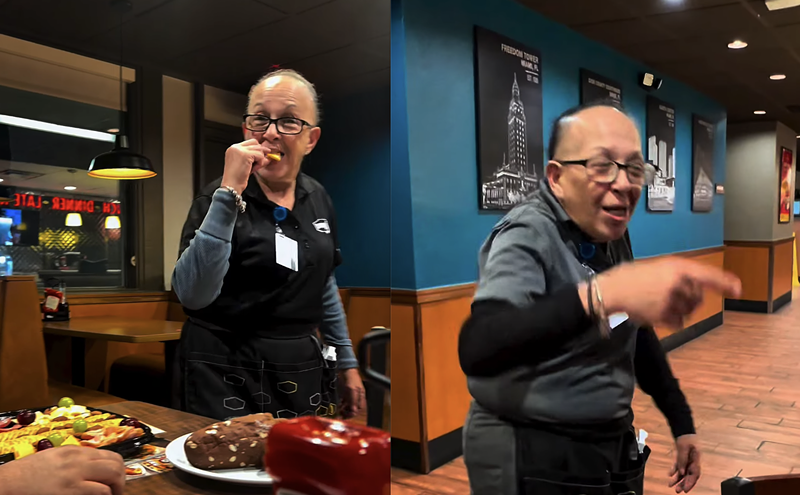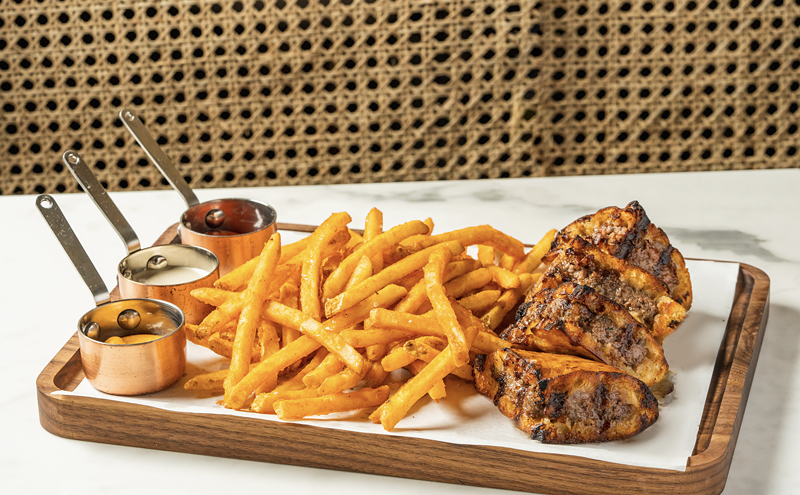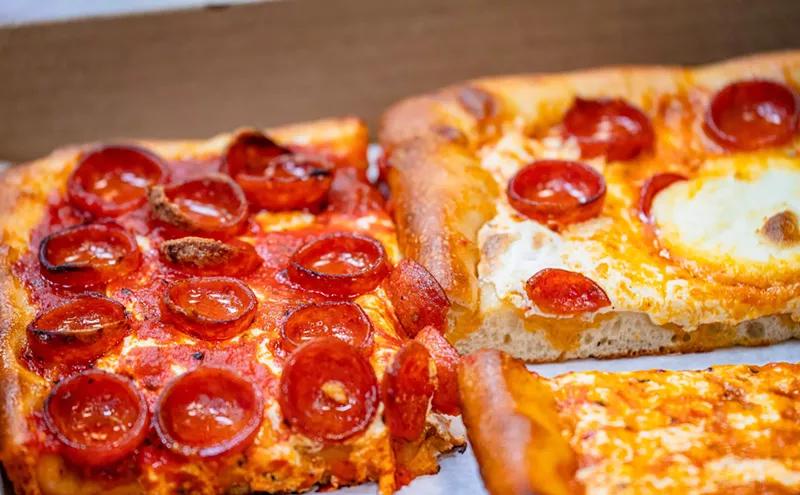Sam Konata pauses to recall the first time he cooked a vegetarian meal for someone. He squints, lifting his eyes toward the enormous red, black, and green crocheted cap perched atop his head. Inside the hat are more than 16 feet of dreadlocks that he began growing when he became a Rasta nearly 50 years ago.
His lips curl into a wistful grin, revealing glittering silver teeth. "I cooked 'em up big, chewy flour dumplings with ackee. That filled 'em up all day, no problem."
It's been decades since Konata, 58, dished out that first vegetarian meal. These days at Konata's, his small place on NW Seventh Avenue, he serves up as many fist bumps as he does sweet, sticky slices of vegan banana bread.
"Better eating can free them from problems, from disease. This is the civil foods movement."
tweet this
Konata's menu, like several others in the area, is rooted in the Rastafari religion that blossomed in Jamaica in the 1930s. It's based on a diet called Ital (rhymes with "vital") that evolved from Hindu vegetarian traditions delivered to Jamaica by indentured Indian servants who arrived with the British. The rules are simple, Konata explains: "Nothing that eat, walk, swim, or crawl."
He moved to Miami in the late 1980s, fleeing Kingston's violence and economic doldrums. He opened his first shop in 1989 on NW 167th Street, where it stood for more than two decades. Five years ago, he moved to the location on NW Seventh Avenue just south of 135th Street. It's easy to spot thanks to the red, yellow, and green trim and window shades.
Inside, the walls are decorated with regal portraits of Ethiopian emperor and Rastafarian prophet Haile Selassie wearing glittering military garb. A framed picture of Konata alongside an ochre-draped monk hangs next to a wood-and-Plexiglas counter where orders are taken. It's a simple process. Just fork over $11.67 and Konata packages up that day's dish. On a recent afternoon, it's a steaming heap of tender brown rice and red quinoa piled next to sweet slices of yellow yams. They're drowned in a savory stew of crushed hemp seeds steeped in tomatoes with a fragrant blend of leeks, parsley, tarragon, and chives.
It's all crowned with a baked plantain that outweighs its deep-fried counterparts dished out at Miami's countless cafeterias. A slow roast intensifies the fruit's natural sweetness and forms an addictive, caramel-like crust at its edges.
The plate is rounded out with a stew of pigeon peas and big, meaty cannellini beans that offer a variety of textures, seasonings, and spice akin to an Indian vegetarian meal. Finally, there's a slice of sweet, sticky cake ($2.14) made with molasses-laced whole cane sugar.
A less strict but no less complex or flavorful take on the Ital diet is offered by 64-year-old Bobby Effs, whose takeout joint, Bobby's Meals, is tucked out of sight in a warehouse complex on Opa-locka Boulevard near NW 22nd Avenue. He eats and serves fish, which tradition permits as long as they're under a foot long.
Effs was born in Saint Mary Parish on Jamaica's north coast and at a young age became the cook for a family of eight that relocated to Kingston. He didn't become a dedicated Rasta until 1972, when he was 18 years old and heard a recorded speech by Marcus Garvey. It espoused the search for what Effs calls a "black king" who would unite the African diaspora and return it to its homeland. "Rasta isn't about the locks," he says, adjusting his own, which are wrapped in a black-and-brown bulb bigger than his head. "Being a Rasta is living the concept of a holy person, trying to live right in every way you can. That's what we're trying to do here."
Fish sustained him as that lesson took root. He soon began lugging nets out to countryside rivers and hauling in tilapia to sell in the city's markets. When the net's bounty waned, Effs packed up and moved to Miami in November 1986. At first, he drove a lunch truck that roved Miami Gardens, Lauderhill, and Miramar, dishing out vegetarian specialties.
In 1990, he took over a drab space with low ceilings and yellow walls he adorned with now-faded pictures of Selassie and Garvey. It's home to an igneous brew of vinegar and chili called escovitch that's slathered over plump, flaky fillets. Like his vegetarian plates, the fish comes alongside a mound of fragrant basmati rice studded with tender red beans. There are stewed peas: kidney and black beans along with tight, smooth pigeon peas cooked off in a slightly sweet, warming union of diced turnips, carrots, beets, and pumpkin flesh. The best part of the $7.07 lunch (and the reason you might consider the larger, $8.99 container) is the small pile of shredded tofu and cabbage stir-fried with soy sauce, ginger, and garlic.
A third take is available at Hakin Alexander's aptly named Vegetarian Restaurant by Hakin on NE 167th Street just a few stoplights east of I-95. The 31-year-old former construction worker was born in Antigua. He became his family's only vegetarian at 6 years old and moved to Miami with his parents when he was 7. He resumed eating meat at age 13 but reverted back to vegetables only at 21.
By 2004, he noticed there were few places in Miami for people without means to find wholesome meals. A cousin was diagnosed with prostate cancer and his grandmother with colon cancer. He soon came to believe the illnesses were linked to low-quality diets.
"I wanted to show people how better eating can free them from problems, from disease," he says. "This is the civil foods movement."
He opened his bamboo-covered restaurant in 2007. Today his small staff turns out a rotating list of daily specials that revolve around tofu and seitan — a slightly chewy, flaky wheat product used to prepare the mock duck found in some Chinese restaurants. It's cooked in a spicy coconut curry and fashioned into "ribs" glazed in a sticky-sweet sauce ($10.95). There's also a plethora of plates ranging from burgers to pizza to bánh mì sandwiches, all lathered in rich, fresh sauces laced with a confetti of fresh herbs.
Between running the kitchen, cutting checks, and taking calls, Alexander fields deeply personal questions. One customer seeks nutritional advice after recently finishing a round of chemotherapy. Another inquires about Swiss bitters, an acrid concoction in a brown dropper bottle that Alexander advises should be taken for a week for a "full-body cleanse."
"Everything people eat now is fake," he says. "The casualness of eating has become life's casualty."
Such a philosophy would seem to preclude Jamaican patties. Not here. The kitchen crew pumps out hundreds of them — but not the crayon-yellow Jamaican patty stuffed with spicy mystery meat. Rather, they make taupe, flaky, whole-wheat-crusted turnovers ($4 each) filled with a spicy, smoky blend of seitan, ackee, the leafy green called callaloo, red pepper, onions, and jerk seasoning, all bound with mashed pigeon peas.
Konata serves his own varieties stuffed with callaloo but calls them "yatties." ("They're not patties; they don't have any meat," he says.) Yet no matter the dish, this food boasts impressive flavor and complexity. But unlike most other dishes served under the health-food banner, these don't come with a high price or a sermon. It's the kind of food that people want to and should eat. The meaning, if that's what you seek, becomes obvious in no time.











